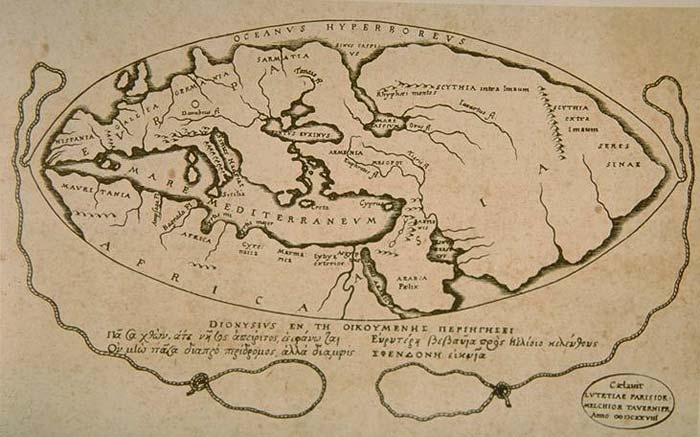|
Athenaeus Of Attalia
Athenaeus of Attalia ( grc, Ἀθήναιος) (1st century AD), was a physician, and the founder of the Pneumatic school of medicine. He was born in Cilicia, at Attalia according to Galen, or at Tarsus according to Caelius Aurelianus. He was the tutor to Theodorus, and appears to have practised medicine at Rome with great success. Athenaeus appears to have written extensively, as the twenty-fourth volume of one of his works is quoted by Galen, and the twenty-ninth by Oribasius. Nothing, however, remains but the titles (his chief work being Περὶ βοηθημάτων lit. ''On Remedies''), and some fragments preserved by Oribasius. Galen gives the following report:Athenaeus of Attaleia ... founded the medical school known as the Pneumatists. It suits his doctrine to speak of a containing cause in illness since he bases himself upon the Stoics and he was a pupil and disciple of Posidonius ... Athenaeus’ three types are as follows: the first consists of containing causes, th ... [...More Info...] [...Related Items...] OR: [Wikipedia] [Google] [Baidu] |
Physician
A physician (American English), medical practitioner (Commonwealth English), medical doctor, or simply doctor, is a health professional who practices medicine, which is concerned with promoting, maintaining or restoring health through the study, diagnosis, prognosis and treatment of disease, injury, and other physical and mental impairments. Physicians may focus their practice on certain disease categories, types of patients, and methods of treatment—known as specialities—or they may assume responsibility for the provision of continuing and comprehensive medical care to individuals, families, and communities—known as general practice. Medical practice properly requires both a detailed knowledge of the academic disciplines, such as anatomy and physiology, underlying diseases and their treatment—the ''science'' of medicine—and also a decent competence in its applied practice—the art or ''craft'' of medicine. Both the role of the physician and the meaning ... [...More Info...] [...Related Items...] OR: [Wikipedia] [Google] [Baidu] |
Pneumatic School
The Pneumatic school of medicine (''Pneumatics'', or ''Pneumatici'', el, Πνευματικοί) was an ancient school of medicine in ancient Greece and Rome. They were founded in Rome by Athenaeus of Cilicia, in the 1st century AD. The Roman era was a time when the Methodic school had enjoyed its greatest reputation, from which the Pneumatic school differed principally in that, instead of the mixture of primitive atoms, they adopted an active principle of immaterial nature, ''pneuma'', or spirit. This principle was the cause of health and disease. It is from Galen that we learn the doctrines of the founder of the Pneumatic school. Doctrines Plato and Aristotle had already laid the foundations of the doctrine of ''pneuma'', for which, Aristotle was the first to describe the ways in which the ''pneuma'' is introduced into the body and the sanguineous system. The Stoics developed the theory even more and applied it to the functions of the body. Erasistratus and his successors had m ... [...More Info...] [...Related Items...] OR: [Wikipedia] [Google] [Baidu] |
Cilicia
Cilicia (); el, Κιλικία, ''Kilikía''; Middle Persian: ''klkyʾy'' (''Klikiyā''); Parthian: ''kylkyʾ'' (''Kilikiyā''); tr, Kilikya). is a geographical region in southern Anatolia in Turkey, extending inland from the northeastern coasts of the Mediterranean Sea. Cilicia has a population ranging over six million, concentrated mostly at the Cilicia plain. The region includes the provinces of Mersin, Adana, Osmaniye, along with parts of Hatay and Antalya. Geography Cilicia is extended along the Mediterranean coast east from Pamphylia to the Nur Mountains, which separates it from Syria. North and east of Cilicia lie the rugged Taurus Mountains that separate it from the high central plateau of Anatolia, which are pierced by a narrow gorge called in antiquity the Cilician Gates. Ancient Cilicia was naturally divided into Cilicia Trachea and Cilicia Pedias by the Limonlu River. Salamis, the city on the east coast of Cyprus, was included in its administrative jurisdictio ... [...More Info...] [...Related Items...] OR: [Wikipedia] [Google] [Baidu] |
Galen
Aelius Galenus or Claudius Galenus ( el, Κλαύδιος Γαληνός; September 129 – c. AD 216), often Anglicized as Galen () or Galen of Pergamon, was a Greek physician, surgeon and philosopher in the Roman Empire. Considered to be one of the most accomplished of all medical researchers of antiquity, Galen influenced the development of various scientific disciplines, including anatomy, physiology, pathology, pharmacology, and neurology, as well as philosophy and logic. The son of Aelius Nicon, a wealthy Greek architect with scholarly interests, Galen received a comprehensive education that prepared him for a successful career as a physician and philosopher. Born in the ancient city of Pergamon (present-day Bergama, Turkey), Galen traveled extensively, exposing himself to a wide variety of medical theories and discoveries before settling in Rome, where he served prominent members of Roman society and eventually was given the position of personal physician to seve ... [...More Info...] [...Related Items...] OR: [Wikipedia] [Google] [Baidu] |
Tarsus (city)
Tarsus ( Hittite: 𒋫𒅈𒊭 ; grc, Ταρσός, label=Greek ; xcl, Տարսոն, label=Armenian ; ar, طَرسُوس ) is a historic city in south-central Turkey, inland from the Mediterranean. It is part of the Adana-Mersin metropolitan area, the fourth-largest metropolitan area in Turkey with a population of 3 million people. Tarsus forms an administrative district in the eastern part of Mersin province and lies at the heart of the region. With a history going back over 6,000 years, Tarsus has long been an important stop for traders and a focal point of many civilisations. During the Roman Empire, it was the capital of the province of Cilicia. It was the scene of the first meeting between Mark Antony and Cleopatra, and the birthplace of St Paul the Apostle. Tarsus is home to one of Turkey's most famous high schools, the Tarsus American College (TAC Tarsus us served by Adana Şakirpaşa Airport and is connected by TCDD trains to both Adana and Mersin. Etymology T ... [...More Info...] [...Related Items...] OR: [Wikipedia] [Google] [Baidu] |
Caelius Aurelianus
Caelius Aurelianus of Sicca in Numidia was a Greco-Roman physician and writer on medical topics. He is best known for his translation from Greek to Latin of a work by Soranus of Ephesus, ''On Acute and Chronic Diseases''. He probably flourished in the 5th century, although some place him two or even three centuries earlier. In favour of the later date is the nature of his Latin, which shows a strong tendency to the Romance, and the similarity of his language to that of Cassius Felix, also an African medical writer, who about 450 wrote a short treatise, chiefly based on Galen. We possess a translation by Aurelianus of two works of Soranus of Ephesus (2nd century), the chief representative of the methodic school of medicine, on chronic and acute maladies—''Tardae'' or ''Chronicae Passiones'', in five, and ''Celeres'' or ''Acutae Passiones'' in three books. The translation, which is especially valuable since the original has been lost, shows that Soranus possessed considerable pr ... [...More Info...] [...Related Items...] OR: [Wikipedia] [Google] [Baidu] |
Theodorus Of Attalia
Theodoros or Theodorus ( el, Θεόδωρος) is a masculine given name, from which Theodore is derived. The feminine version is Theodora. It may refer to: Ancient world :''Ordered chronologically'' * Theodorus of Samos, 6th-century BC Greek sculptor, architect and inventor * Theodorus of Cyrene, 5th-century BC Libyan Greek mathematician * Theodorus of Byzantium, late 5th-century BC Greek sophist and orator * Theodorus the Atheist (c. 340–c. 250 BC), Libyan Greek philosopher * Theodorus of Athamania (), King of a tribe in Epirus * Theodorus (meridarch) (), civil governor of the Swat province of the Indo-Greek kingdom * Theodorus of Gadara, 1st-century BC Greek rhetorician * Theodorus of Asine (), Greek Neoplatonist philosopher * Theodorus of Tabennese (c. 314–368), Egyptian Christian monk * Theodorus (usurper) (), Roman usurper against Emperor Valens * Theodorus Priscianus, 4th-century physician at Constantinople * Theodorus I (bishop of Milan) (died 490) * Theodorus (consu ... [...More Info...] [...Related Items...] OR: [Wikipedia] [Google] [Baidu] |
Rome
, established_title = Founded , established_date = 753 BC , founder = King Romulus (legendary) , image_map = Map of comune of Rome (metropolitan city of Capital Rome, region Lazio, Italy).svg , map_caption = The territory of the ''comune'' (''Roma Capitale'', in red) inside the Metropolitan City of Rome (''Città Metropolitana di Roma'', in yellow). The white spot in the centre is Vatican City. , pushpin_map = Italy#Europe , pushpin_map_caption = Location within Italy##Location within Europe , pushpin_relief = yes , coordinates = , coor_pinpoint = , subdivision_type = Country , subdivision_name = Italy , subdivision_type2 = Region , subdivision_name2 = Lazio , subdivision_type3 = Metropolitan city , subdivision_name3 = Rome Capital , government_footnotes= , government_type = Strong Mayor–Council , leader_title2 = Legislature , leader_name2 = Capitoline Assembl ... [...More Info...] [...Related Items...] OR: [Wikipedia] [Google] [Baidu] |
Oribasius
Oribasius or Oreibasius ( el, Ὀρειβάσιος; c. 320 – 403) was a Greek medical writer and the personal physician of the Roman emperor Julian. He studied at Alexandria under physician Zeno of Cyprus before joining Julian's retinue. He was involved in Julian's coronation in 361, and remained with the emperor until Julian's death in 363. In the wake of this event, Oribasius was banished to foreign courts for a time, but was later recalled by the emperor Valens. Works Oribasius's major works, written at the behest of Julian, are two collections of excerpts from the writings of earlier medical scholars, a collection of excerpts from Galen and the ''Medical Collections'' (Ἰατρικαὶ Συναγωγαί, ''Iatrikai Synagogai''; Latin: ''Collectiones medicae''), a massive compilation of excerpts from other medical writers of the ancient world. The first of these works is entirely lost, and only 25 of the 70 (or 72) books of the ''Collectiones'' survive. This work pre ... [...More Info...] [...Related Items...] OR: [Wikipedia] [Google] [Baidu] |
Posidonius
Posidonius (; grc-gre, Ποσειδώνιος , "of Poseidon") "of Apameia" (ὁ Ἀπαμεύς) or "of Rhodes" (ὁ Ῥόδιος) (), was a Greek politician, astronomer, astrologer, geographer, historian, mathematician, and teacher native to Apamea, Syria. He was considered the most learned man of his time and, possibly, of the entire Stoic school. After a period learning Stoic philosophy from Panaetius in Athens, he spent many years in travel and scientific researches in Spain, Africa, Italy, Gaul, Liguria, Sicily and on the eastern shores of the Adriatic. He settled as a teacher at Rhodes where his fame attracted numerous scholars. Next to Panaetius he did most, by writings and personal lectures, to spread Stoicism to the Roman world, and he became well known to many leading men, including Pompey and Cicero. His works are now lost, but they proved a mine of information to later writers. The titles and subjects of more than twenty of them are known. In common with othe ... [...More Info...] [...Related Items...] OR: [Wikipedia] [Google] [Baidu] |


_-_Veloso_Salgado.png)
.jpg)

